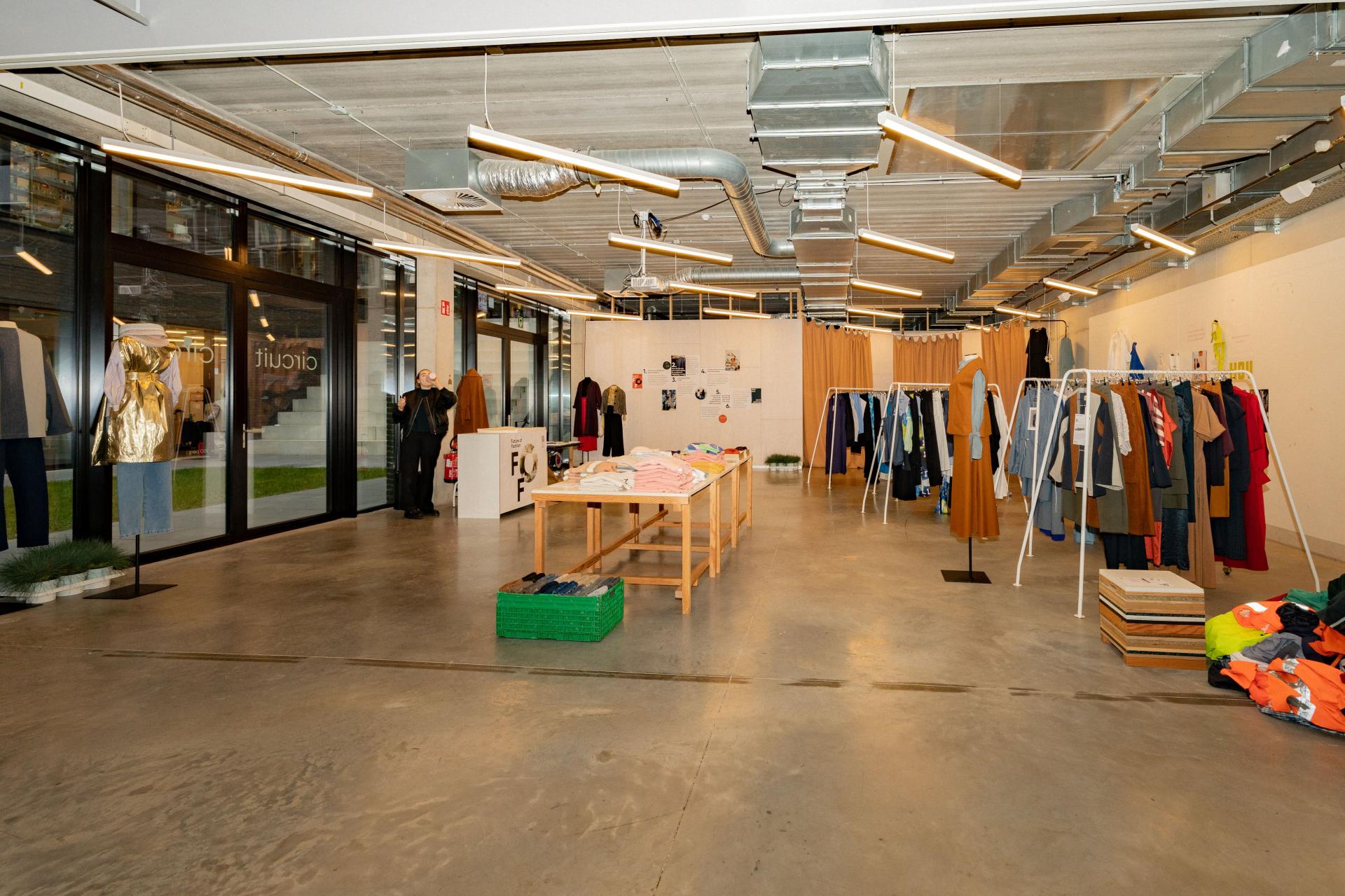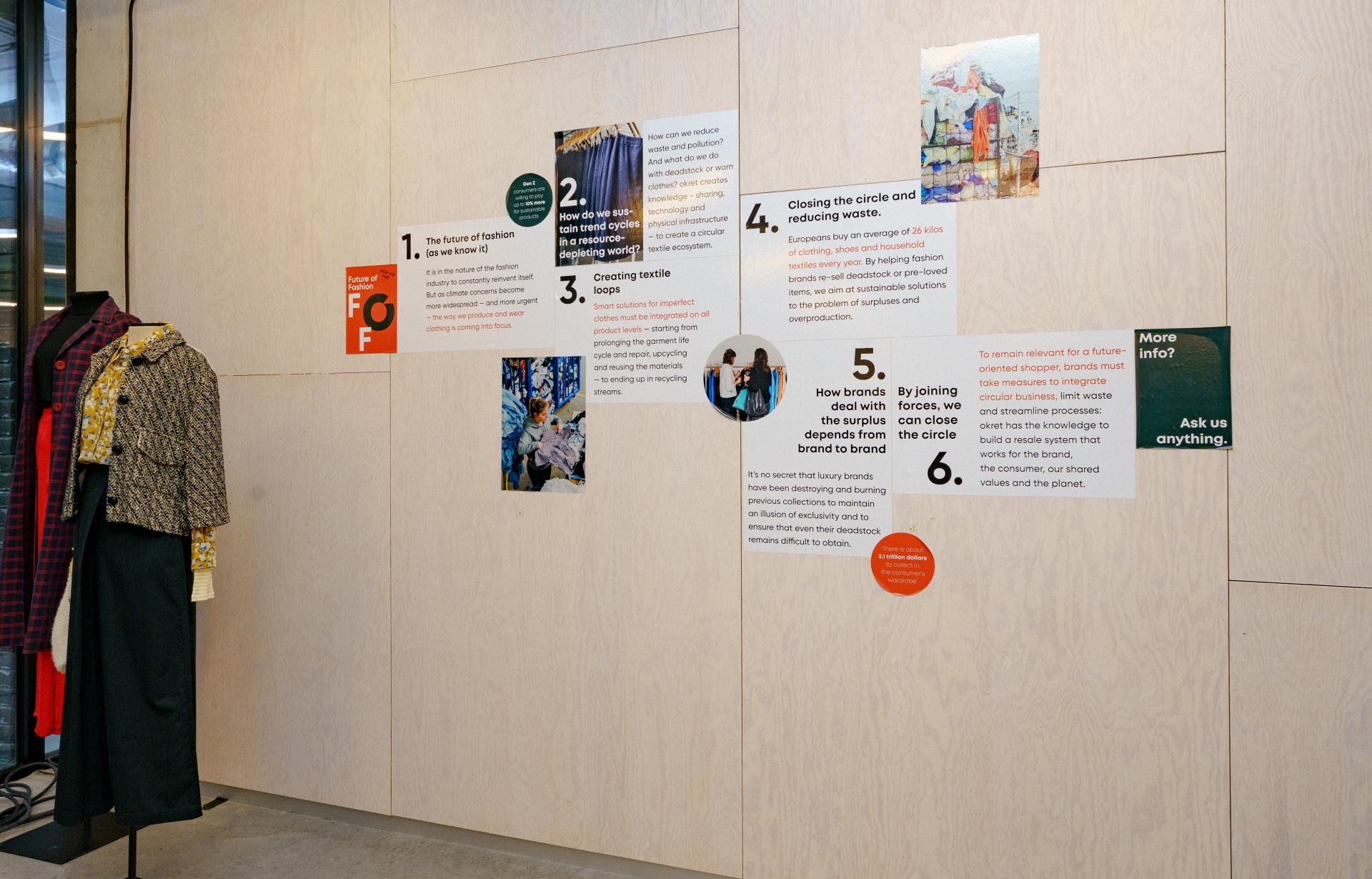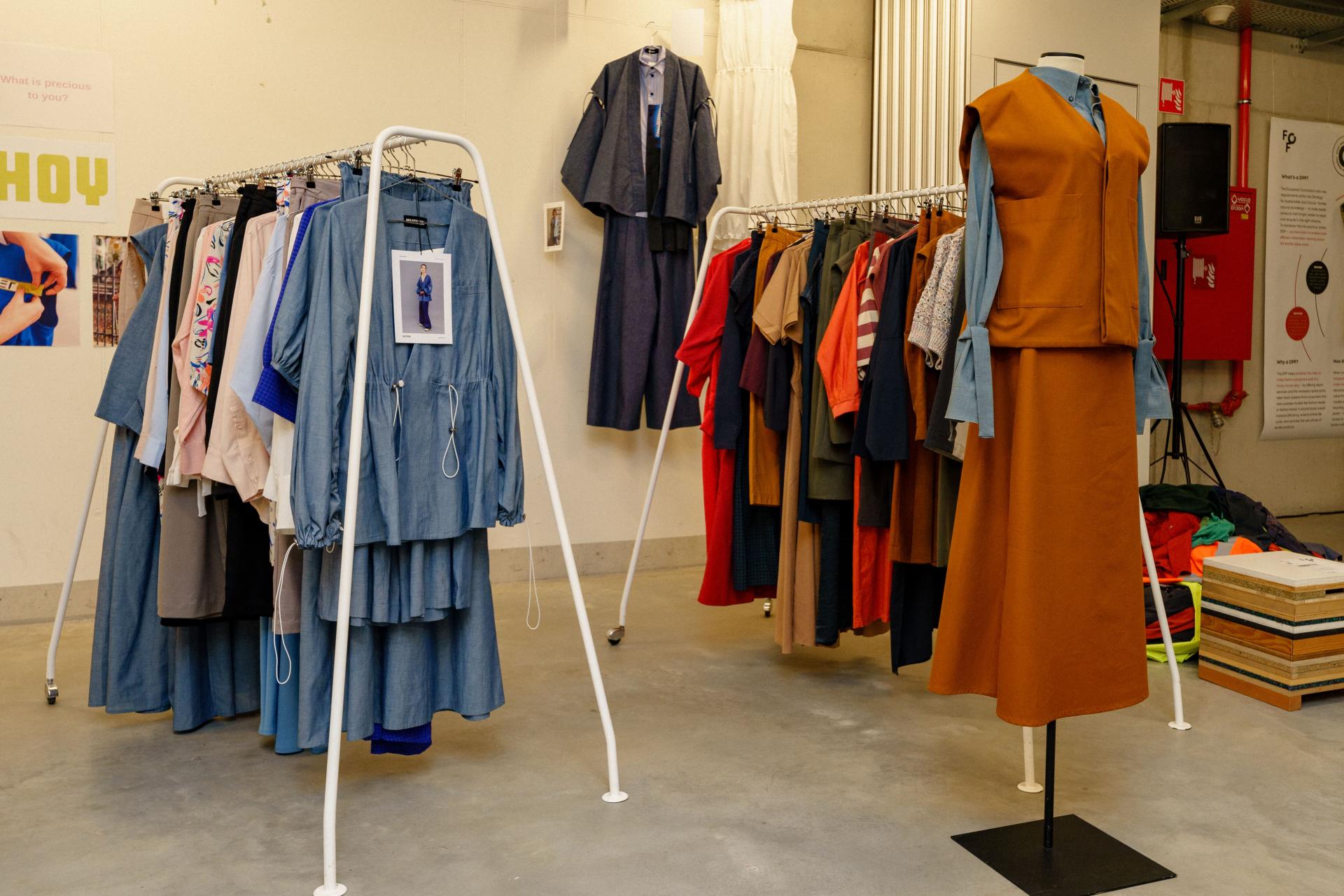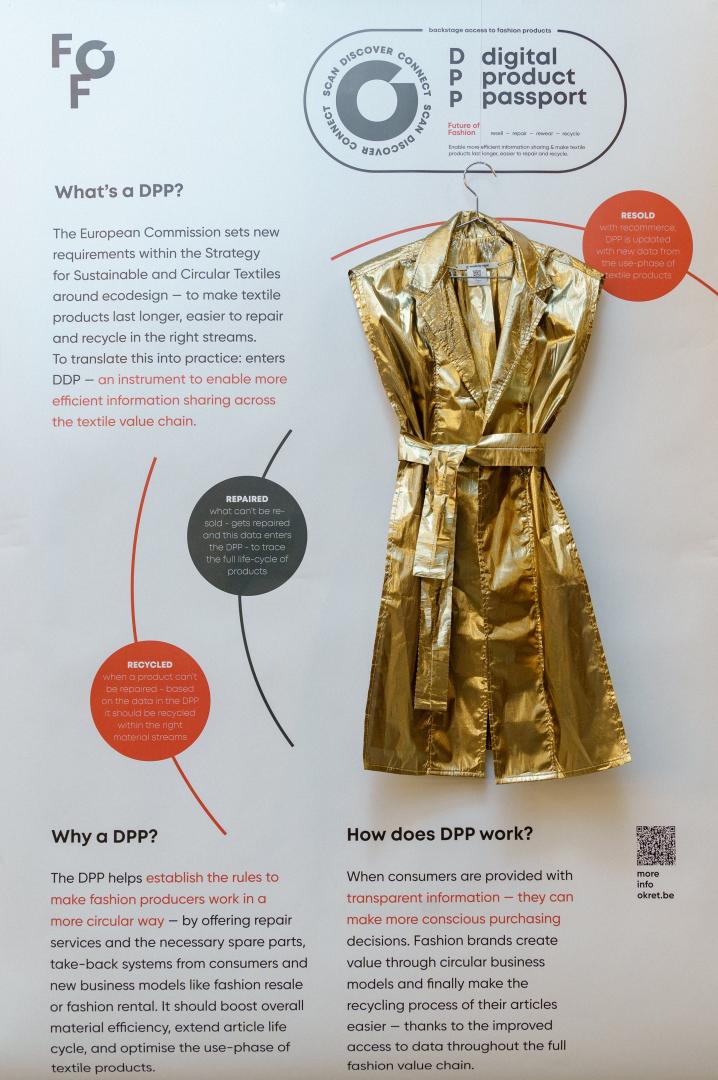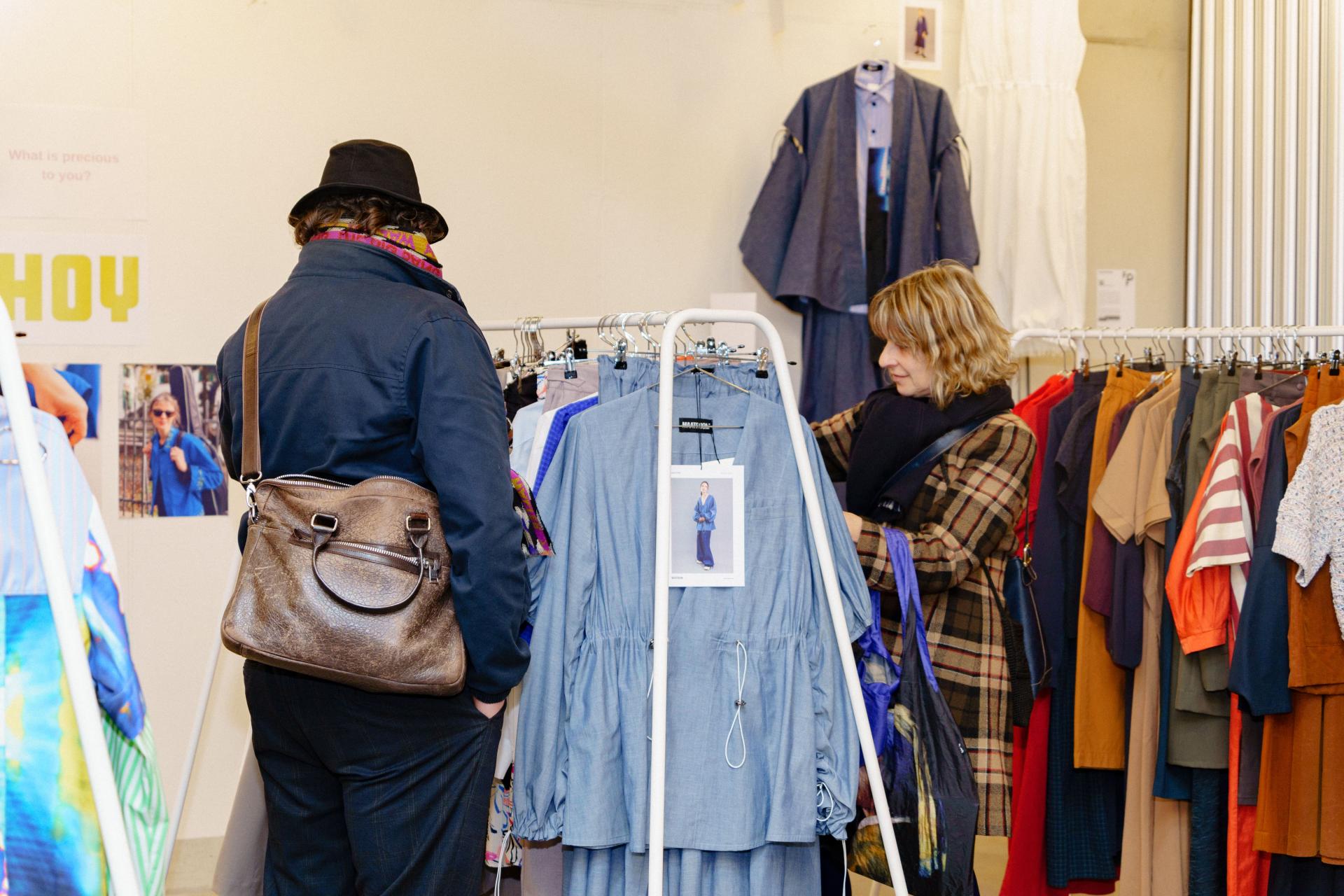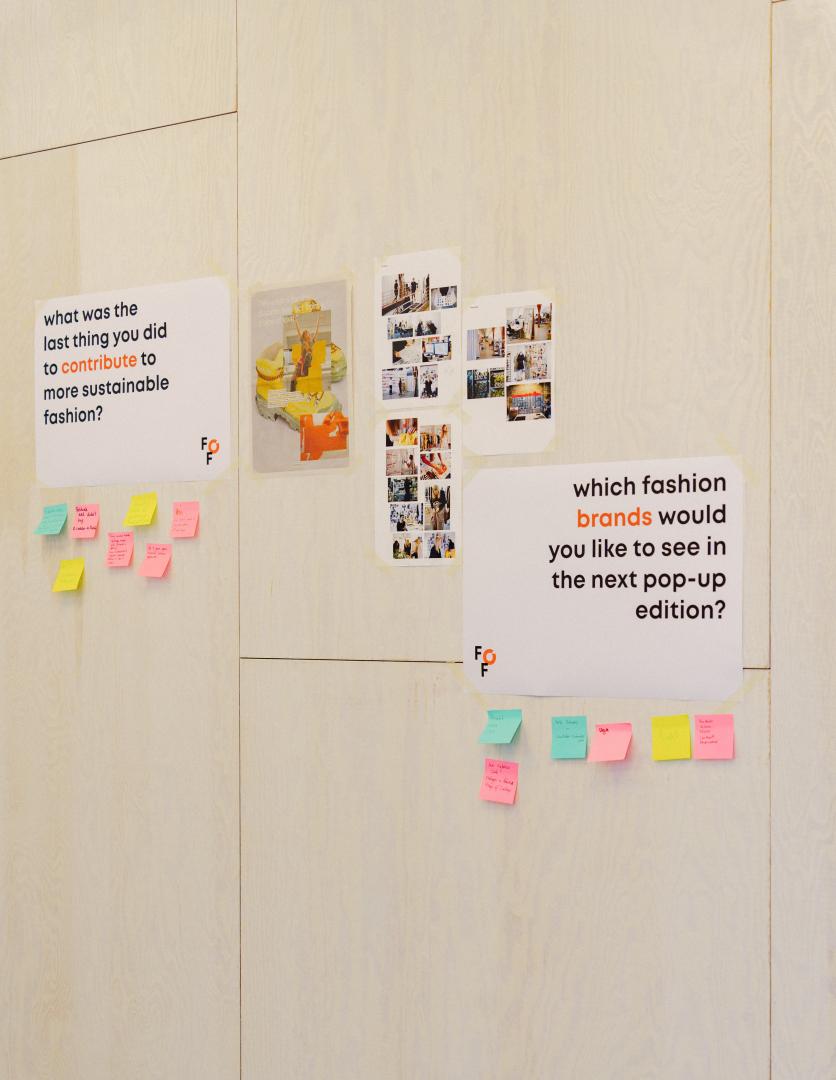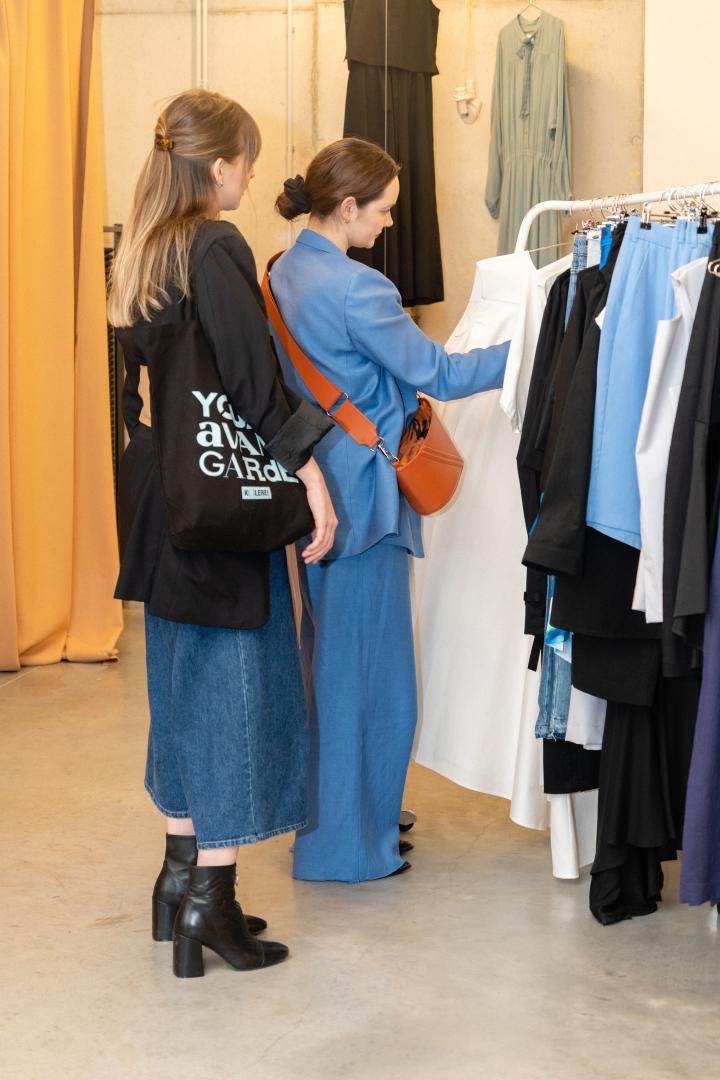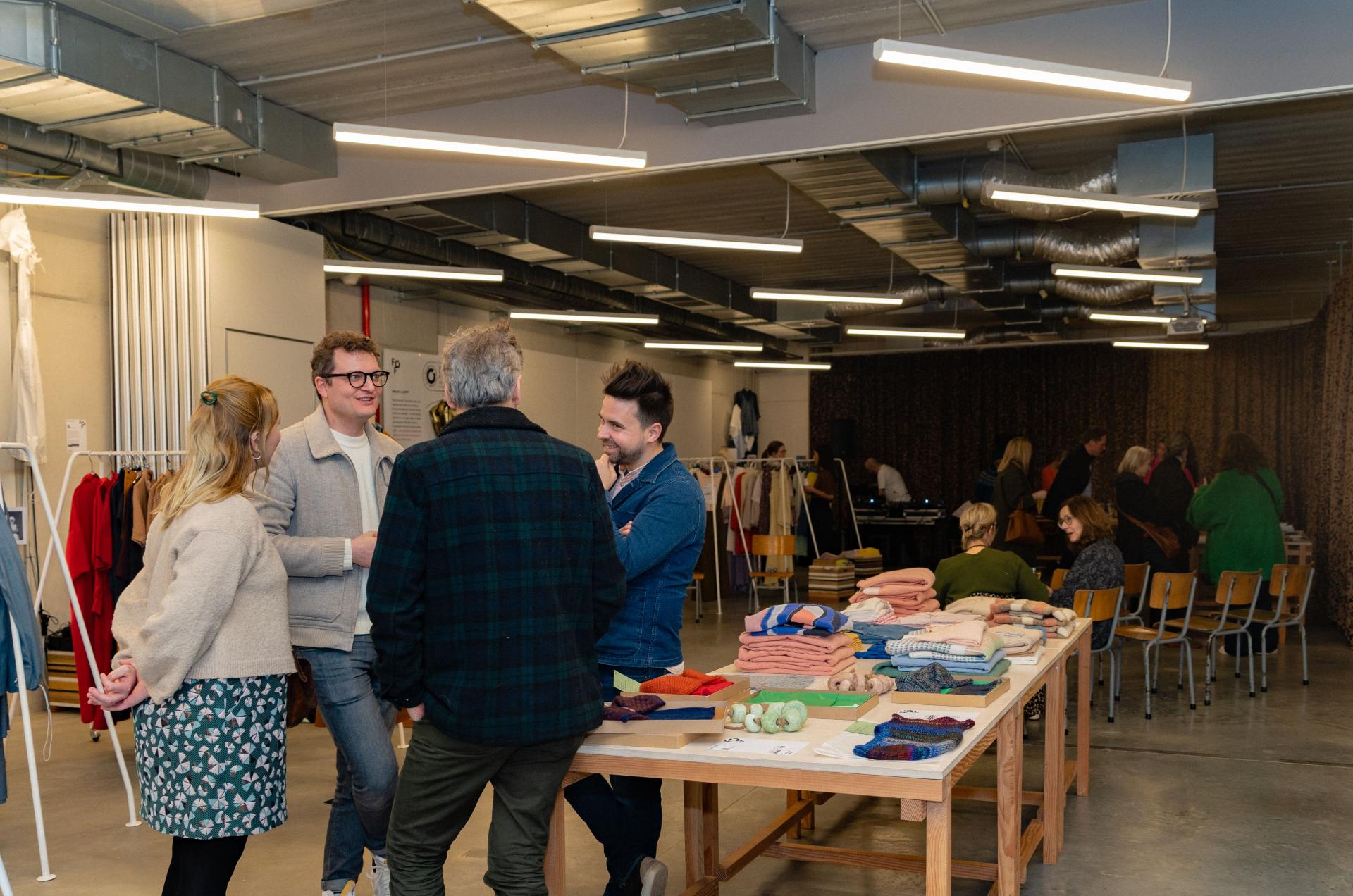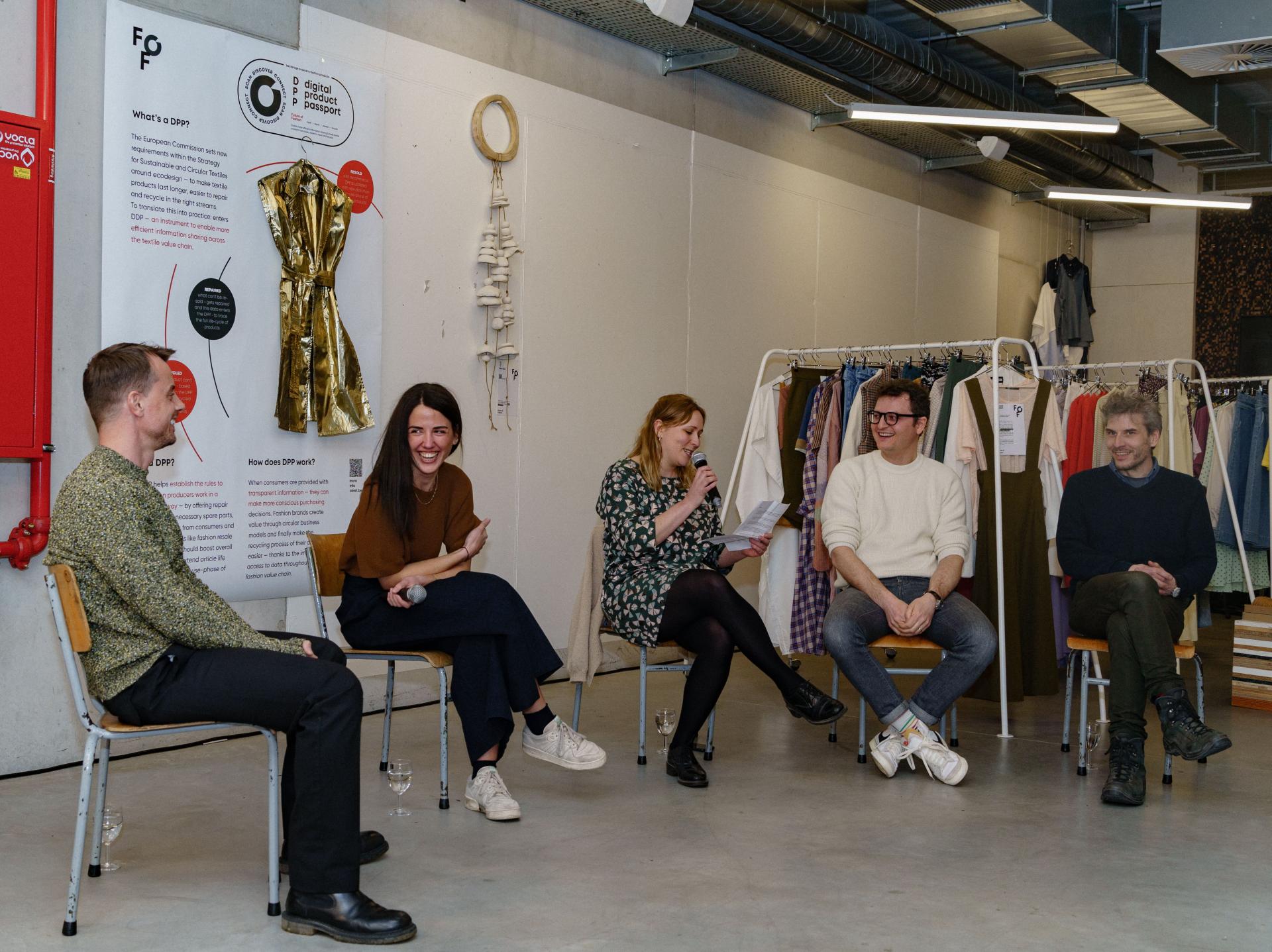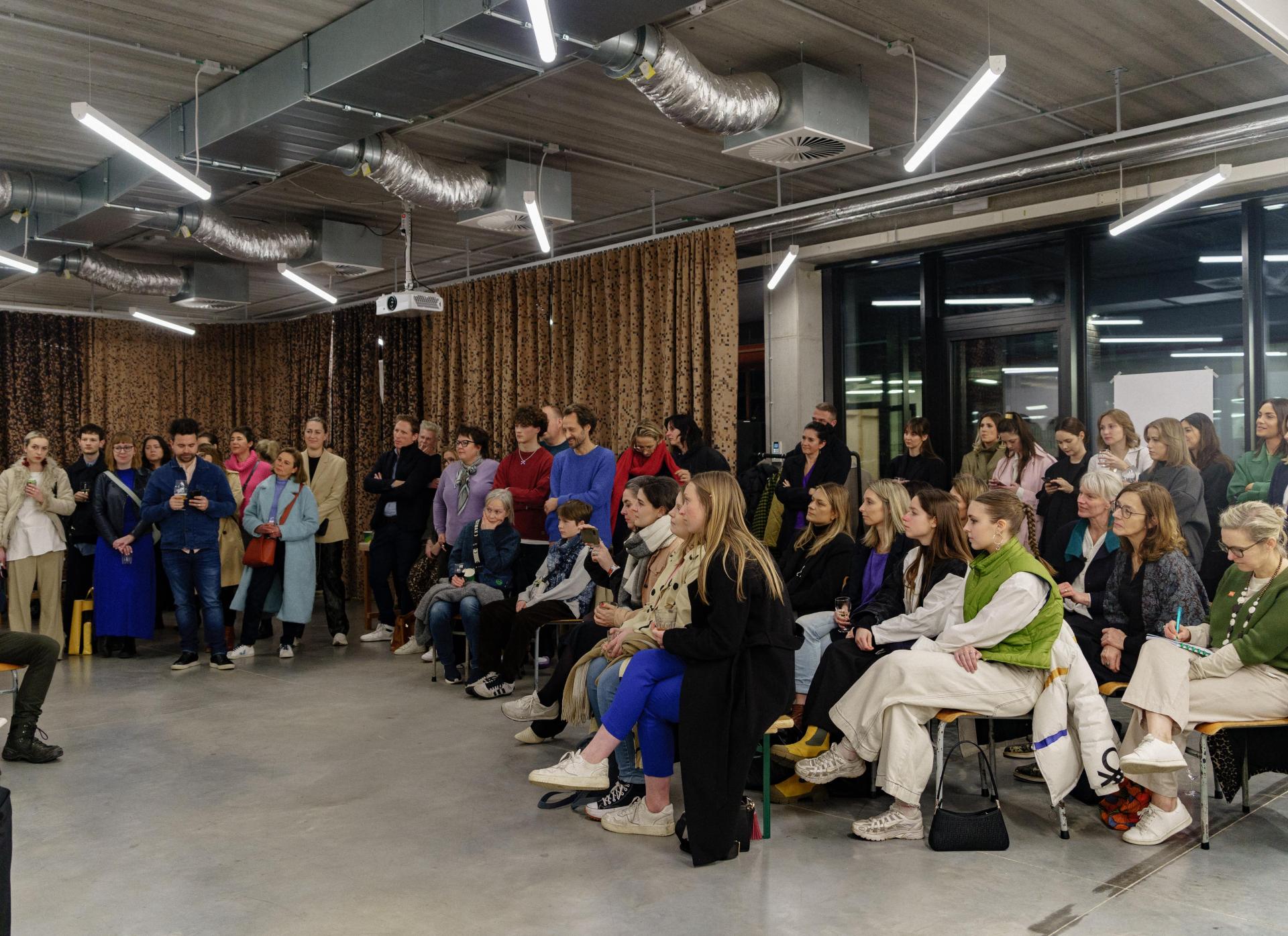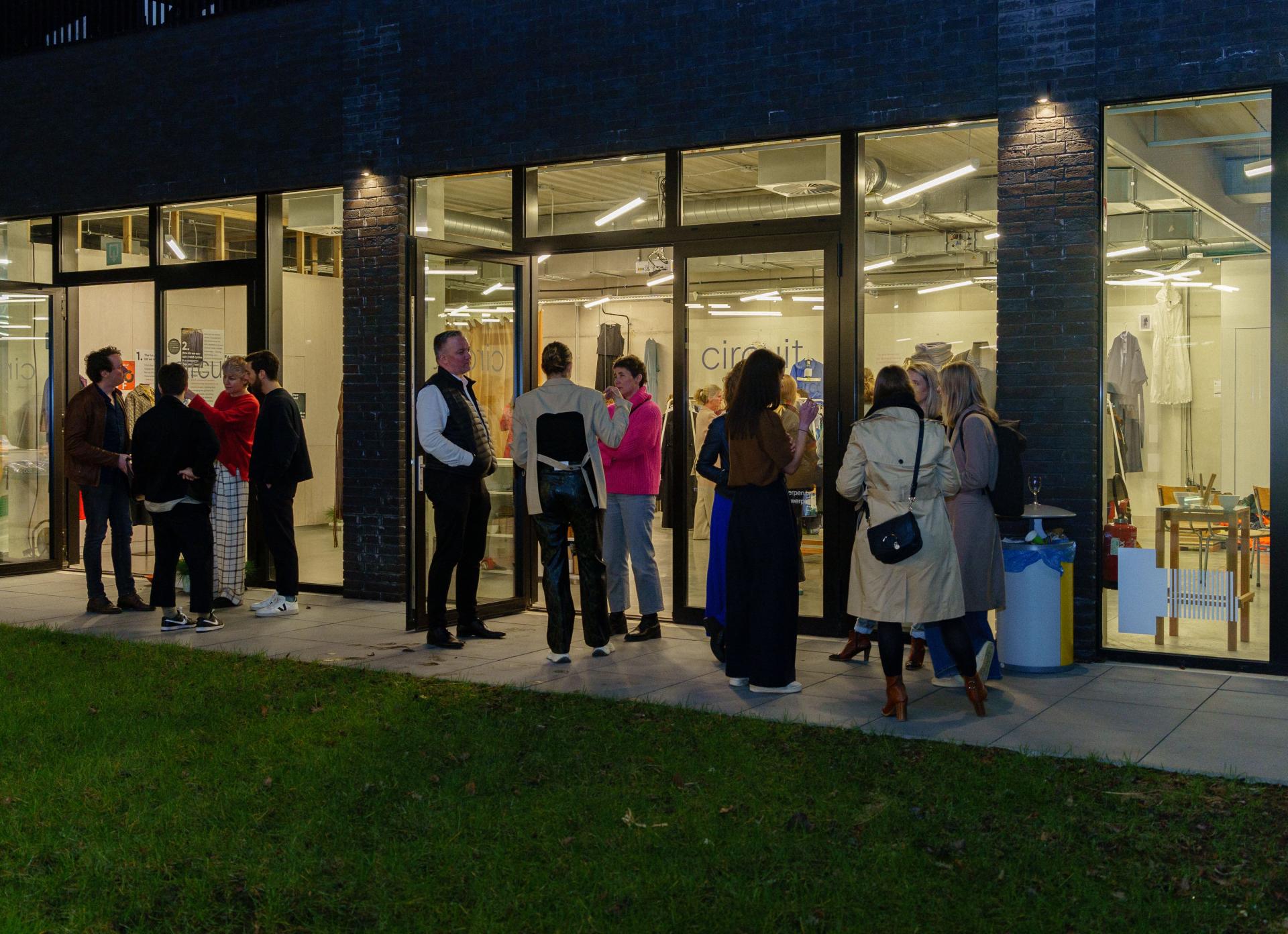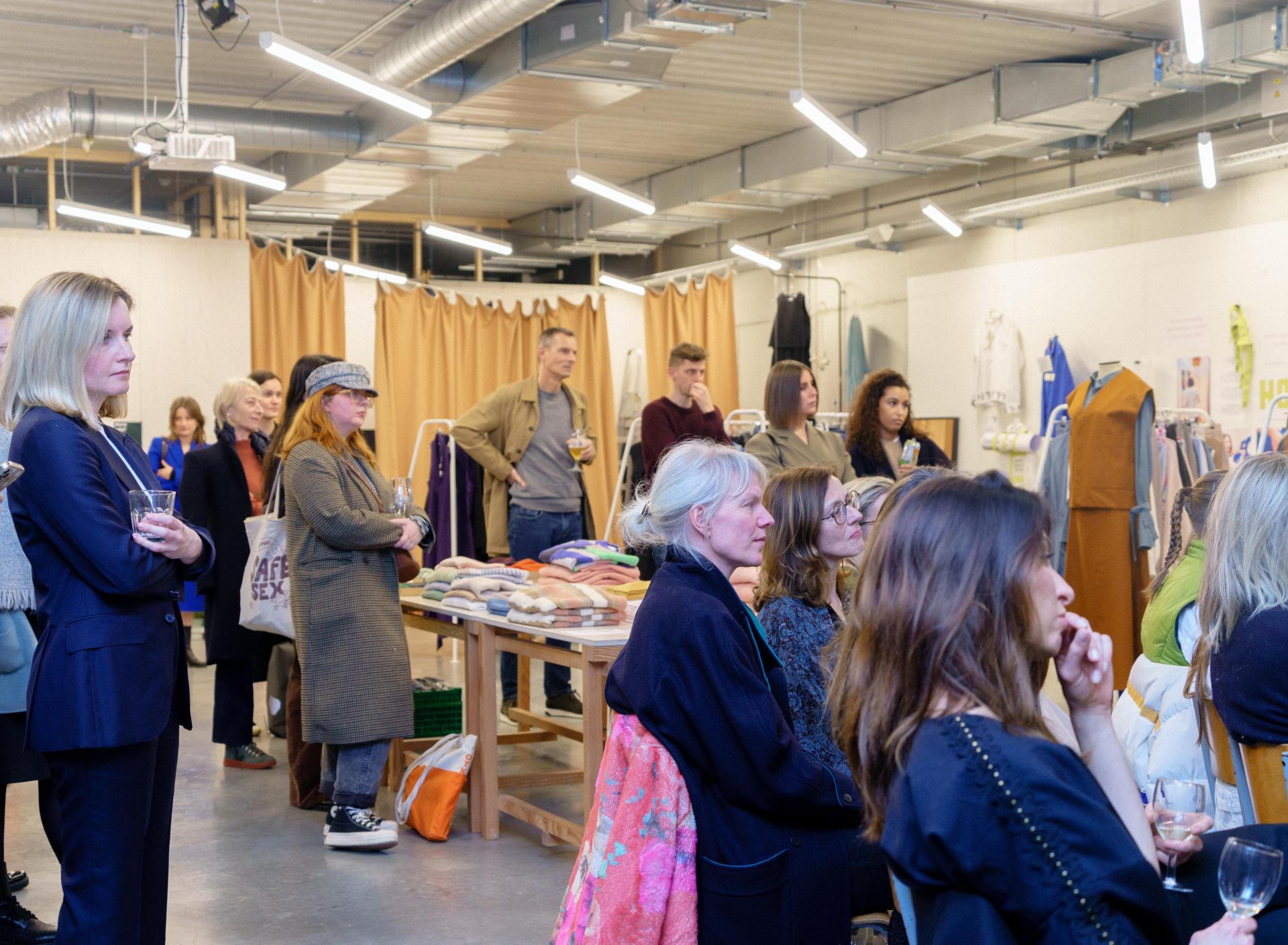FoF Antwerp
Basic information
Project Title
FoF Antwerp
Full project title
Future of Fashion Antwerp
Category
Shaping a circular industrial ecosystem and supporting life-cycle thinking
Project Description
The future of fashion is circular, digital, and inclusive. To showcase this, okret launched its first pop-up event in Antwerp - a combination of knowledge sharing, circular shopping, and events focusing on interaction between the industry professional and the consumers. Our goal? To raise awareness about sustainable fashion, motivate and involve visitors in initiating their own transition. Together, we aim to build a united community, transforming the textile industry towards a circular future.
Geographical Scope
Local
Project Region
City of Antwerp, Belgium
Urban or rural issues
Mainly urban
Physical or other transformations
It refers to other types of transformations (soft investment)
EU Programme or fund
No
Description of the project
Summary
okret is a one-stop shop for transitioning fashion brands to a circular economy, offering knowledge, technology and operational support for future-proofing their business models. We create efficient end-of-life solutions, utilizing data from take-back to transition design, production, and communication processes toward the economy of the future.
In spring 2023, okret introduced the Future of Fashion pop-up - a space for fashion professionals, enthusiasts, and consumers to explore the world of circular fashion, underlying okret’s mission to spark conversations about sustainability, inform, inspire, experiment, and, most importantly, engage consumers.
The pop-up brought together circular shopping, knowledge sharing, and inspiring events. Visitors explored a curated selection of second-hand and upcycled clothing from various brands, alongside regenerated pieces crafted by zero-waste designers. The space also provided a platform for new circular brands to showcase their creations.
Workshops offered a hands-on approach, while panels with diverse guests aimed to educate on circular economy principles and sustainable living. To illustrate the concept of circularity in fashion, three interactive boxes labeled "repair," "made to fit," and "idea" encouraged visitors to embrace circular consumption by participating in activities like repairing their items or exploring tailor-made options.
The concluding event marked a symbolic new beginning. To commit to the circular economy, insights and aspirations gathered during the pop-up were transformed into a manifesto, capturing goals for the upcoming months, symbolically signed by all participants as a pledge to actively support circular practices.
During the pop-up, okret unveiled REMODE, an in-house creative project that revolutionizes the production process by completely recycling it. This showcases co-creation possibilities, highlighting the use of unsellable residual materials, without compromising the beauty.
In spring 2023, okret introduced the Future of Fashion pop-up - a space for fashion professionals, enthusiasts, and consumers to explore the world of circular fashion, underlying okret’s mission to spark conversations about sustainability, inform, inspire, experiment, and, most importantly, engage consumers.
The pop-up brought together circular shopping, knowledge sharing, and inspiring events. Visitors explored a curated selection of second-hand and upcycled clothing from various brands, alongside regenerated pieces crafted by zero-waste designers. The space also provided a platform for new circular brands to showcase their creations.
Workshops offered a hands-on approach, while panels with diverse guests aimed to educate on circular economy principles and sustainable living. To illustrate the concept of circularity in fashion, three interactive boxes labeled "repair," "made to fit," and "idea" encouraged visitors to embrace circular consumption by participating in activities like repairing their items or exploring tailor-made options.
The concluding event marked a symbolic new beginning. To commit to the circular economy, insights and aspirations gathered during the pop-up were transformed into a manifesto, capturing goals for the upcoming months, symbolically signed by all participants as a pledge to actively support circular practices.
During the pop-up, okret unveiled REMODE, an in-house creative project that revolutionizes the production process by completely recycling it. This showcases co-creation possibilities, highlighting the use of unsellable residual materials, without compromising the beauty.
Key objectives for sustainability
The key objectives of okret revolve around facilitating the transition of fashion brands to a circular economy, emphasizing sustainability at every stage of the fashion industry, which is today widely based on a fast linear system: produce – use – dispose. The fashion shopper, on the contrary, is becoming more conscious and wants to act more sustainably. There is a rising demand for more production transparency, and social and environmental efforts throughout the whole value chain. Having identified this, okret launched the Future of Fashion pop-up hub, as a significant step towards achieving our objectives by inviting all players into the conversation under the slogan let’s talk circular fashion.
The pop-up hub was organized to jointly transform the current linear value chain (1. DESIGN 2. SOURCING 3. PRODUCTION 4. LOGISTICS AND MERCHANDISE 5. SELLING (6. USE 7. DISPOSAL by the end consumer, often in the wrong way, leaving garments in the unsorted waste or lower level marketplaces, losing their real value) to the new value chain which would look like this: 1. DESIGN 2. PURCHASING 3. PRODUCTION 4. LOGISTICS AND MERCHANDISE 5. SELLING 6. USE 7. RETURN OF USED TEXTILES 8. NEW SALE (resale/repair & resale/remanufacture & resale) 9. RETURN / REPEAT SALE UNTIL WORN 10. DISPOSAL. All aspects of the pop-up were curated having this in mind - from the selection of topics and panelists, brands and designers, to all other activities aimed to engage all visitors and motivate them to reconsider their current practices and adopt more sustainable habits. The Future of Fashion pop-up hub extends beyond a physical space; it fosters a vibrant fashion community, shedding light on sustainability in fashion, the responsibilities of all stakeholders, and essential guidelines, including proper recycling practices.
The pop-up hub was organized to jointly transform the current linear value chain (1. DESIGN 2. SOURCING 3. PRODUCTION 4. LOGISTICS AND MERCHANDISE 5. SELLING (6. USE 7. DISPOSAL by the end consumer, often in the wrong way, leaving garments in the unsorted waste or lower level marketplaces, losing their real value) to the new value chain which would look like this: 1. DESIGN 2. PURCHASING 3. PRODUCTION 4. LOGISTICS AND MERCHANDISE 5. SELLING 6. USE 7. RETURN OF USED TEXTILES 8. NEW SALE (resale/repair & resale/remanufacture & resale) 9. RETURN / REPEAT SALE UNTIL WORN 10. DISPOSAL. All aspects of the pop-up were curated having this in mind - from the selection of topics and panelists, brands and designers, to all other activities aimed to engage all visitors and motivate them to reconsider their current practices and adopt more sustainable habits. The Future of Fashion pop-up hub extends beyond a physical space; it fosters a vibrant fashion community, shedding light on sustainability in fashion, the responsibilities of all stakeholders, and essential guidelines, including proper recycling practices.
Key objectives for aesthetics and quality
Central to okret's vision is the understanding that fashion is a form of art and a powerful medium for self-expression. The project emphasizes that sustainability and aesthetics can coexist harmoniously, debunking the myth that eco-friendly fashion sacrifices style. The pop-up hub serves as a canvas where the artistry of fashion is not compromised but elevated through sustainable practices and was curated with the overarching objective of transforming the current linear value chain while maintaining a focus on aesthetics and experience. Every facet of the pop-up, from events to workshops and the selection of designers, was orchestrated with these goals in mind.
As a testament to this philosophy, okret organized an inspirational styling workshop within the pop-up. The workshop went beyond mere fashion guidance, delving into the intricacies of outfits that empower both figure and personality. The focus was on steering visitors away from impulsive purchases, guiding them to invest in pieces that resonate with their personal style and can be enjoyed for years. Attendees discovered silhouettes and colors that complemented their figures and individual styles, ensuring that the curated wardrobe resonated with their unique personalities.
The pop-up store within the hub featured upcycled pieces from well-known brands, as well as okret’s creative in house project REMODE made entirely of residual materials, offering visitors not only environmentally conscious options but also statement pieces that are unique or produced in limited quantities.
As a testament to this philosophy, okret organized an inspirational styling workshop within the pop-up. The workshop went beyond mere fashion guidance, delving into the intricacies of outfits that empower both figure and personality. The focus was on steering visitors away from impulsive purchases, guiding them to invest in pieces that resonate with their personal style and can be enjoyed for years. Attendees discovered silhouettes and colors that complemented their figures and individual styles, ensuring that the curated wardrobe resonated with their unique personalities.
The pop-up store within the hub featured upcycled pieces from well-known brands, as well as okret’s creative in house project REMODE made entirely of residual materials, offering visitors not only environmentally conscious options but also statement pieces that are unique or produced in limited quantities.
Key objectives for inclusion
At okret, fostering an inclusive circular revolution is a core commitment. The Future of Fashion Antwerp was therefore designed to embrace inclusivity on multiple fronts. The event's schedule and program were thoughtfully crafted to amplify diverse perspectives, welcoming input from industry representatives, consumers, and visionary students.
In selecting brands for the pop-up, a deliberate effort was made to exemplify a shared dedication to sustainability. Notably, emphasis was placed on featuring small, independent zero-waste designers who champion circularity and upcycling, such as Andrea Bos, HOY wearable, and CTRN.a. This focus not only supports local and small-scale initiatives but also acts as a catalyst for emerging creatives, fostering a dynamic and sustainable local ecosystem.
The commitment to inclusion extended beyond brand selection. Events were strategically organized in a venue ensuring full physical accessibility, fostering an environment where everyone could participate fully. Crucially, all events were offered free of charge, with optional registration for logistical reasons, ensuring maximum flexibility for attendees. This approach dismantles financial barriers, aligning with the project's ethos of making sustainable fashion accessible to all.
In selecting brands for the pop-up, a deliberate effort was made to exemplify a shared dedication to sustainability. Notably, emphasis was placed on featuring small, independent zero-waste designers who champion circularity and upcycling, such as Andrea Bos, HOY wearable, and CTRN.a. This focus not only supports local and small-scale initiatives but also acts as a catalyst for emerging creatives, fostering a dynamic and sustainable local ecosystem.
The commitment to inclusion extended beyond brand selection. Events were strategically organized in a venue ensuring full physical accessibility, fostering an environment where everyone could participate fully. Crucially, all events were offered free of charge, with optional registration for logistical reasons, ensuring maximum flexibility for attendees. This approach dismantles financial barriers, aligning with the project's ethos of making sustainable fashion accessible to all.
Results in relation to category
The Future of Fashion initiative yielded significant success, resonating well with the general public and attracting substantial media attention. Event attendance met and exceeded okret's expectations and targets outlined in the project planning phase. However, the impact transcends numerical metrics, extending to those who learned about the initiative through various channels.
While the influence of the event is challenging to quantify, its effects ripple beyond immediate attendees. The true impact lies in the subtle yet meaningful shifts in consumer behavior, reflected in decisions to abstain from new purchases in favor of second-hand, repair, or upcycled options. These choices contribute positively to environmental sustainability, embodying a broader, far-reaching impact.
The feedback collected during the events serves as a valuable guide for future endeavors. It provides insights into the optimal event structure and identifies key topics that resonate with the audience. This iterative approach ensures that okret can continually refine and enhance its initiatives, fostering a sustainable and influential impact on both the fashion industry and the wider community.
While the influence of the event is challenging to quantify, its effects ripple beyond immediate attendees. The true impact lies in the subtle yet meaningful shifts in consumer behavior, reflected in decisions to abstain from new purchases in favor of second-hand, repair, or upcycled options. These choices contribute positively to environmental sustainability, embodying a broader, far-reaching impact.
The feedback collected during the events serves as a valuable guide for future endeavors. It provides insights into the optimal event structure and identifies key topics that resonate with the audience. This iterative approach ensures that okret can continually refine and enhance its initiatives, fostering a sustainable and influential impact on both the fashion industry and the wider community.
How Citizens benefit
FoF Antwerp was an inclusive and engaging initiative that actively involved citizens, local residents, students, and fashion enthusiasts in a series of informative and hands-on events, serving as a catalyst for meaningful engagement from the community.
Citizens and participants, including local residents, students, and fashion enthusiasts, directly benefited from industry insights through the freely accessible events. The accessibility of the events ensured a diverse audience, contributing to a higher level of awareness not only among the attendees but also resonating with brands involved in the project.
The five events conducted in a short timeframe played a pivotal role in broadening participants' understanding of sustainable initiatives. Attendees gained insights on taking their first steps into sustainable practices and navigating the balance between following trends and addressing environmental challenges. The impact of these events was not only educational but also sparked real-life conversations between industry experts and consumers.
The sofa-talk sessions and the idea-box provided platforms for participants to seek answers to their questions and engage in reflective discussions on more philosophical aspects of sustainability. These interactive elements facilitated a two-way dialogue, allowing citizens to actively contribute to the discourse around sustainable fashion.
The workshops, designed to be fun and entertaining, demonstrated how simple skills and daily habits, such as styling old pieces, can counteract the prevailing throw-away culture. By making sustainability accessible and enjoyable, these workshops empowered participants to integrate eco-friendly practices into their daily lives.
The conversations between industry professionals and consumers highlighted significant gaps in awareness about the intricacies of the fashion and textile industry and the importance of initiatives like FoF Antwerp in bridging these gaps.
Citizens and participants, including local residents, students, and fashion enthusiasts, directly benefited from industry insights through the freely accessible events. The accessibility of the events ensured a diverse audience, contributing to a higher level of awareness not only among the attendees but also resonating with brands involved in the project.
The five events conducted in a short timeframe played a pivotal role in broadening participants' understanding of sustainable initiatives. Attendees gained insights on taking their first steps into sustainable practices and navigating the balance between following trends and addressing environmental challenges. The impact of these events was not only educational but also sparked real-life conversations between industry experts and consumers.
The sofa-talk sessions and the idea-box provided platforms for participants to seek answers to their questions and engage in reflective discussions on more philosophical aspects of sustainability. These interactive elements facilitated a two-way dialogue, allowing citizens to actively contribute to the discourse around sustainable fashion.
The workshops, designed to be fun and entertaining, demonstrated how simple skills and daily habits, such as styling old pieces, can counteract the prevailing throw-away culture. By making sustainability accessible and enjoyable, these workshops empowered participants to integrate eco-friendly practices into their daily lives.
The conversations between industry professionals and consumers highlighted significant gaps in awareness about the intricacies of the fashion and textile industry and the importance of initiatives like FoF Antwerp in bridging these gaps.
Physical or other transformations
It refers to other types of transformations (soft investment)
Innovative character
In the current fashion landscape, the industry predominantly operates within a fast, linear system—producing, using, and disposing—leading to significant waste streams and global ecosystem pollution. However, consumers are increasingly conscious, demanding greater transparency and sustainability throughout the entire fashion value chain. As the fashion industry grapples with the challenges of a rapidly changing world, the need for reinvention is not merely a creative pursuit but a fundamental requirement for the planet's sustainability.
The fashion market's fragmentation is evident, with the world's largest clothing groups constituting less than 30% of the total market value in 2020, according to GlobalData. The majority rests in the hands of numerous small and medium-sized enterprises (SMEs). Operating within a high-pressure tempo, fashion brands face tight production deadlines, and their profit and loss statements are tightly linked to the financial targets of the latest collection. This leaves minimal room for sustainability-oriented innovation. Compounded by the absence of clear national and international policies on sustainable goals and waste management responsibilities, brands grapple with the challenge of integrating circular economy practices. Many lack the in-house sustainability knowledge and capacity required for this transformative shift.
Amidst this scenario, the Future of Fashion (FoF) pop-up emerges as a compelling alternative that addresses the current industry challenges by providing a platform that encourages sustainability-oriented innovation. The pop-up serves not only as an educational hub but also as a bridge between industry professionals, smaller designers, and a conscious consumer base, providing a transformative space where sustainable practices can flourish. FoF pop-up thus stands as a beacon of change, steering the fashion industry toward a more sustainable and responsible future.
The fashion market's fragmentation is evident, with the world's largest clothing groups constituting less than 30% of the total market value in 2020, according to GlobalData. The majority rests in the hands of numerous small and medium-sized enterprises (SMEs). Operating within a high-pressure tempo, fashion brands face tight production deadlines, and their profit and loss statements are tightly linked to the financial targets of the latest collection. This leaves minimal room for sustainability-oriented innovation. Compounded by the absence of clear national and international policies on sustainable goals and waste management responsibilities, brands grapple with the challenge of integrating circular economy practices. Many lack the in-house sustainability knowledge and capacity required for this transformative shift.
Amidst this scenario, the Future of Fashion (FoF) pop-up emerges as a compelling alternative that addresses the current industry challenges by providing a platform that encourages sustainability-oriented innovation. The pop-up serves not only as an educational hub but also as a bridge between industry professionals, smaller designers, and a conscious consumer base, providing a transformative space where sustainable practices can flourish. FoF pop-up thus stands as a beacon of change, steering the fashion industry toward a more sustainable and responsible future.
Disciplines/knowledge reflected
The central purpose of the Future of Fashion (FoF) pop-up lies in its commitment to knowledge sharing and the exploration of diverse perspectives within the fashion industry. Engaging in dialogues with industry experts and representatives constituted a focal point. Through these interactions, we delved into the real-life challenges faced by the industry, bridging different professional roles (from sustainability consultants, through designers, to innovation directors and company CEOs) and perspectives across the entire fashion value chain. This holistic approach aimed to decipher what constitutes a future-proof strategy and unravel the complexities that may impede implementation. First-hand testimonials from mature organization representatives provided valuable insights, offering strategic approaches and highlighting quick wins that can be realized in the interim.
Simultaneously, the FoF pop-up extended its outreach to students, particularly high school students. By welcoming them with a theoretical introduction to the circular economy within the clothing and textile industry, the project addressed knowledge gaps not always covered in traditional classrooms. The intention was not only to impart theoretical knowledge but also to inspire students with a hands-on approach. By fostering a creative and efficient awareness-raising initiative, the project endeavors to cultivate a critical mass of informed consumers for the future.
Simultaneously, the FoF pop-up extended its outreach to students, particularly high school students. By welcoming them with a theoretical introduction to the circular economy within the clothing and textile industry, the project addressed knowledge gaps not always covered in traditional classrooms. The intention was not only to impart theoretical knowledge but also to inspire students with a hands-on approach. By fostering a creative and efficient awareness-raising initiative, the project endeavors to cultivate a critical mass of informed consumers for the future.
Methodology used
The methodology employed for this project revolves around a multifaceted approach tailored to address global challenges while providing effective local solutions within the fashion industry. Recognizing the urgent need for sustainability, transparency, and ethical practices, the project adopts a holistic strategy rooted in knowledge sharing, industry dialogues, and community engagement. The main goal of the project was to showcase how inspiring and stylish the resale business can be - both for brands and for consumers.
Leveraging cross-industry collaborations through B2B initiatives, the project dismantles silos and opens avenues for creative possibilities such as resale, upcycling, and made-to-fit practices. The success of these methods, demonstrated on a small scale during workshops, showcases their potential for seamless integration into larger working methods, positioning sustainable practices as integral to the industry's core.
In parallel, the public is educated through workshops, talks, and interactive exhibits. These components are aimed to have far-reaching implications for their fashion choices, cultivating awareness about the detrimental effects of fast fashion and advocating for the benefits of ethical, sustainable, and conscious decisions. The project's educational initiatives extend to high school students, bridging knowledge gaps and inspiring future generations to embrace sustainable practices.
Leveraging cross-industry collaborations through B2B initiatives, the project dismantles silos and opens avenues for creative possibilities such as resale, upcycling, and made-to-fit practices. The success of these methods, demonstrated on a small scale during workshops, showcases their potential for seamless integration into larger working methods, positioning sustainable practices as integral to the industry's core.
In parallel, the public is educated through workshops, talks, and interactive exhibits. These components are aimed to have far-reaching implications for their fashion choices, cultivating awareness about the detrimental effects of fast fashion and advocating for the benefits of ethical, sustainable, and conscious decisions. The project's educational initiatives extend to high school students, bridging knowledge gaps and inspiring future generations to embrace sustainable practices.
How stakeholders are engaged
The FoF Antwerp project exemplifies a collaborative effort engaging stakeholders at local, national, and European levels. The commitment to accessibility was evident in events open to the general public, fostering awareness and engagement within the local community. Local designers and Belgian brands were pivotal, promoting sustainable practices and contributing to the regional fashion ecosystem. The involvement of industry stakeholders, including Frank Dingemans, Peter Perquy, Sara Kovic, Christian Wijnants, Britt Buseyne, and Donia Sassie, brought invaluable insights directly from the fashion and sustainable industry, enriching the dialogue and understanding of sector challenges and opportunities.
Furthermore, during the pop-up, an Italian brand MAATROOM was introduced to the Belgian market, broadening the project's impact and fostering cross-cultural collaboration.
The City of Antwerp also played a role, serving as the main coordinator of the venue (Circuit - circular economy lab) where the pop-up hub was organized.
Furthermore, during the pop-up, an Italian brand MAATROOM was introduced to the Belgian market, broadening the project's impact and fostering cross-cultural collaboration.
The City of Antwerp also played a role, serving as the main coordinator of the venue (Circuit - circular economy lab) where the pop-up hub was organized.
Global challenges
The current, linear business model that is largely applied in the industry today, positions fashion as one of the top polluting industries. The need to start producing and consuming less clothing with increased consideration for the environmental and social footprint has become more and more pressing, underpinned by the upcoming legislative changes. This systematic shift that the industry is already undergoing aims to change all phases of the garment lifecycle - from choice of material and design to production and consumption. This means changing the mindset of both producers and consumers, who have been living in a world of overproduction and overconsumption for decades. To achieve so, it is necessary to start looking at sustainability as an opportunity, rather than a burden. And to do this, it is necessary to foster an inclusive, knowledge-sharing culture and close the circle by joining forces and acting locally, to see the changes globally.
Learning transferred to other parties
The concept of Future of Fashion pop-up hubs can be, and this is what we at okret will be striving to achieve, in it entirety transferred and replicated to other locations. The issue addressed by the pop-up hub is universally relevant, transcending geographical boundaries and making similar projects imperative beyond the city of Antwerp and Belgium.
In a world where consumer awareness and calls for sustainability, transparency, and ethical practices are gaining momentum, the Future of Fashion (FoF) emerges as a perfect solution poised to address these global concerns. The impending European Union acts, including the Corporate Social Responsibility Directive, Corporate Social Due Diligence, Eco-design for Sustainable Products Regulation, and Extended Producers’ Responsibility Directive, signify a pivotal shift towards more sustainable and circular practices within the business landscape.
The FoF pop-up hub becomes particularly crucial in this context as it aligns seamlessly with the anticipated changes in EU regulations. By fostering knowledge sharing, industry dialogues, and community engagement, FoF positions itself as an ideal platform for brands to adopt and showcase sustainable and circular practices. The hub not only provides a space for industry stakeholders to navigate these impending changes but also serves as an educational arena for end consumers.
In a world where consumer awareness and calls for sustainability, transparency, and ethical practices are gaining momentum, the Future of Fashion (FoF) emerges as a perfect solution poised to address these global concerns. The impending European Union acts, including the Corporate Social Responsibility Directive, Corporate Social Due Diligence, Eco-design for Sustainable Products Regulation, and Extended Producers’ Responsibility Directive, signify a pivotal shift towards more sustainable and circular practices within the business landscape.
The FoF pop-up hub becomes particularly crucial in this context as it aligns seamlessly with the anticipated changes in EU regulations. By fostering knowledge sharing, industry dialogues, and community engagement, FoF positions itself as an ideal platform for brands to adopt and showcase sustainable and circular practices. The hub not only provides a space for industry stakeholders to navigate these impending changes but also serves as an educational arena for end consumers.
Keywords
sustainability
circularity
inclusion
transformation
fashion

